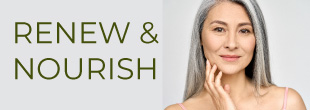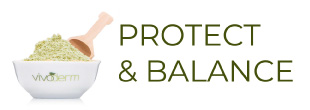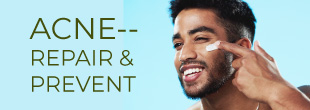Why Natural Facial Skincare is Best for You
Our skin is the largest organ of the body and protects the rest of our organs from outside elements and harm. We have all been taught to take care of our skin not only to look good, but also to be healthy.
The benefits of eating organic, whole foods have been getting a lot of press in recent years. If you want beautiful skin, a healthy inside will reflect a healthy outside. Today, natural and organic skin care is the fastest growing area in the skin care and beauty industry.
Why natural? Some facial cleansers and products have been known to contain many chemicals such as parabens, to preserve their shelf life. Parabens are actually harmful to the skin, and overall health. Organic skin care products are all natural and do not contain any chemicals or preservatives. “Natural skin care” can and might contain some chemical constituents, but strives to be as natural as possible. The key ingredients used to make these products contain few if any toxins or chemicals.
You may then ask, “Do natural or organic skin care products expire more quickly than others?” The answer is no. In order to extend the product’s shelf life, manufacturers recommend you use something sanitary–such as a spatula–to remove products from containers and always close containers directly after use. It is widely agreed upon that once skin care products of any kind are opened and exposed to air, they should be used or thrown out after 6 months.
When natural facial masks and treatments are used to treat skin disorders such as eczema and acne, they are much less likely to cause irritation to sensitive skin. Choosing natural is a beneficial and safe way to take care of your skin and overall health. Today there are many organic and natural soaps and cleansers to choose from, including cleansers, toners, moisturizers, make-up and even anti-aging serums. Some organic ingredients you may already have at home are: essential oils like ginger and tea tree, natural plant oils such as grape seed and almond oil, and herbs such as lavender and green tea. You can use these in your bath or make fabulous natural, facial treatments. The internet or your local library has hundreds of great recipes to choose.
Organic fruits such as papaya, apples, citrus and cucumbers are proven to have a healthy effect on the skin, due to the absence of toxic pesticides. As you can imagine, there are many great organic and natural soaps and cleansers available for retail, if you’re not interested in making your own home remedies. However, “natural” doesn’t always mean organic and labels can be deceiving; do some research on ingredients that seem skeptical.
The intent of this article is to help you be aware what you are putting on your skin and what harmful ingredients may be looming in your favorite skin care products. Now that you know more about natural, organic skin care follow the below home recipe for a great glow!
Make sure that your at home ingredients are certified organic.
Moisturizing Avocado Mask:
1 avocado, 1 teaspoon of apple vinegar, 1 egg white, 3 teaspoons of olive oil. Peel and mash avocado. Separate and beat egg white, add to mashed avocado along with other ingredients. Apply to face and wash off after 20 minutes.




